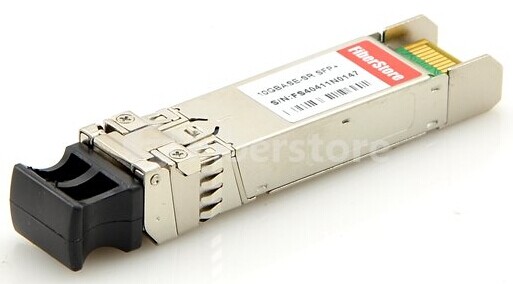Are you still spending hundreds of dollars on the expensive optical transceiver modules for your network system in the data center? In order to cut down the costs on the expensive transceiver modules, many companies are seeking for a compatible third-party transceiver to use. For example, if your network contains Juniper routers, firewalls, and switches, you might think that only Juniper SFP branded transceivers will ensure that all of your equipment is compatible and functions optimally. However, that seemingly reasonable assumption could cost your company thousands of dollars. Compared to the third-party optical transceiver produced by third-party companies, Juniper SFP transceiver comes with dramatically inflated price tags while a third-party compatible one is roughly 80 percent less expensive than Juniper branded SFP transceiver.
What Does "Third-Party" Mean?
In commerce, a "third-party" means a supplier (or service provider) who is not directly controlled by either the seller (first party) or the customer/buyer (second party) in a business transaction. For example, in the fiber optics industry, all fiber optic transceivers are defined by Multi-Source Agreement (MSA). MSAs strictly define the operating characteristics of fiber optic networking equipment, so that system vendors may implement ports in their devices that allow MSA compliant networking components produced by different manufacturers are interoperable. As long as a manufacturer complies to MSA guidelines, their transceiver modules will function and operate identically to any other manufacturer's MSA-compliant transceivers. For instance, HP BladeSystem 455883-B21 compatible 10GBASE-SR SFP+ transceiver from FS.COM will function identically to a HP 455883-B21 transceiver and will be 100% compatible with HP networking equipment.

Optical transceivers are some of the most all-around useful pieces of hardware for a network. As long as your equipment has SFP/SFP+ ports -which most do- transceivers allow you to change between a multitude of uplink types, to fit whatever wiring you have or will have in the future. They're simple, plug-and-play, and hot-swappable. Third-party optical transceivers can easily prevent thousands of dollars in new hardware costs. In spite of what's often implied by official documentation, a quality third-party optical transceiver is 100% compatible with name-brand equipment. There's simply no difference between good quality third-party transceivers and branded ones. So why choose to pay more?
Three Reasons Why Third-Party Optical Transceivers Just Make Sense
1. Low costs
The lower costs of third-party optics really cannot be overstated. Depending on the model, name brands are anywhere from 50% to 1000% more expensive than third-party alternatives. For example, you can get the Cisco QSFP-40G-CSR4 compatible 40GBASE-CSR4 QSFP+ transceiver with only $110 at FS.COM which ensures the same performance with a Cisco branded QSFP-40G-CSR4 transceiver.
The lower costs of third-party optics really cannot be overstated. Depending on the model, name brands are anywhere from 50% to 1000% more expensive than third-party alternatives. For example, you can get the Cisco QSFP-40G-CSR4 compatible 40GBASE-CSR4 QSFP+ transceiver with only $110 at FS.COM which ensures the same performance with a Cisco branded QSFP-40G-CSR4 transceiver.
In many cases, a full loadout of third-party transceivers can shave so much money off of an upgrade budget to fund entirely new pieces of hardware. Or they can put a piece of equipment within range, which wouldn't have been if name-brand ports had to be purchased.
2. Full standards compliance
Only a few factories in the world produce optics, and they make the transceivers for everyone. Those heavily-discounted third-party may be made in the same facilities as the official Cisco, HP, or Juniper units. And since transceivers are fully specified by internationally agreed-upon standards anyway, there's no risk of incompatibilities.
Only a few factories in the world produce optics, and they make the transceivers for everyone. Those heavily-discounted third-party may be made in the same facilities as the official Cisco, HP, or Juniper units. And since transceivers are fully specified by internationally agreed-upon standards anyway, there's no risk of incompatibilities.
All it takes is code loaded on an EPROM -included in the transceiver- identifying it to your networking hardware and, basically, your equipment can't tell the difference.
3. Lifetime warranty
Besides having much higher prices, the name-brand transceivers also tend to have fairly short warranty periods. It's generally anywhere from a couple years, down to only 90 days. While failure is fairly rare, it's unfortunate that they have such short warranty periods, especially compared to the hardware they're used in.
Besides having much higher prices, the name-brand transceivers also tend to have fairly short warranty periods. It's generally anywhere from a couple years, down to only 90 days. While failure is fairly rare, it's unfortunate that they have such short warranty periods, especially compared to the hardware they're used in.
However, when you buy third-party optics from FS.COM, you will get a full lifetime warranty. That's how certain we are that they truly are of quality equal or better to the name-brand units. As long as your transceivers are in use, they're covered under warranty.
Conclusion
If you're still hesitant about trying a compatible SFP transceiver from a third party manufacturer, the best way to ensure that you're getting a reliable product at a good deal is to choose a vendor you trust, one with a proven track record of quality products and great customer service. Really, there's no compelling reason to over-pay for the name brand optics. Just like buying generic medications at the pharmacy, there is truly no difference aside from the name that's on the packaging.
No comments:
Post a Comment